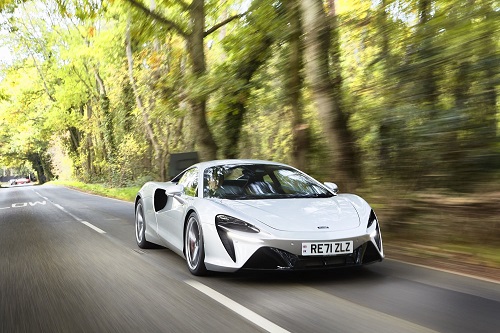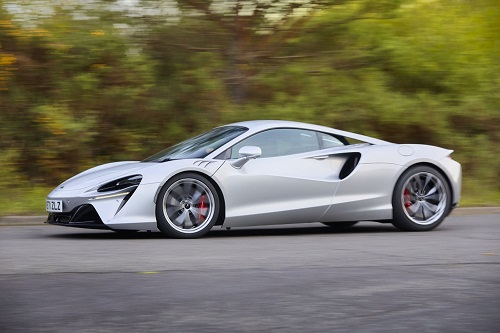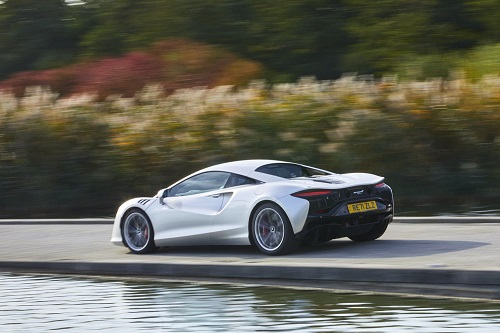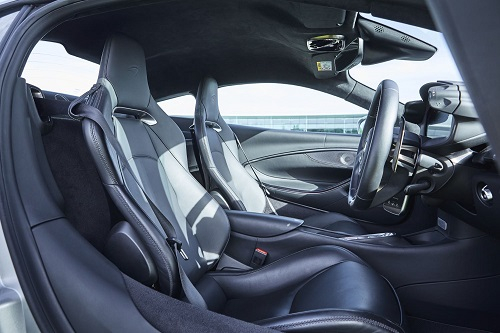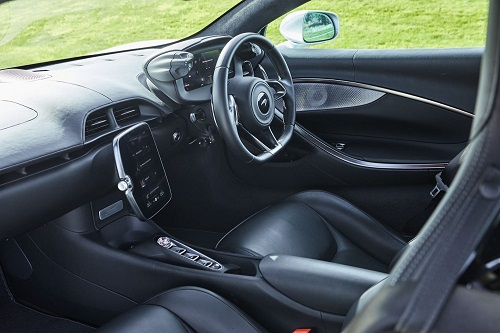A huge multi-million pound investment, new management with encouragement for a brand that has uncompromisingly delivered drivers’ cars, has now enabled, embraced and enriched the latest hybrid powertrain technology.
But, of course, being McLaren it always does things a differently, distinctively – the McLaren way – and the new two-seater Artura is not only a technical tour-de-force but retains that basic drive to satisfy enthusiastic owners and put in their hands a car which can be taken to the shops or slingshot around a circuit.
A good car should always be an easy car to drive, to use and enjoy without worries, and the McLaren Artura shows us how they will use hybrid technology to lower emissions while improving performance, a double whammy.
It’s a plug-in hybrid and takes about 2.5hrs to reach 80% capacity charge with a recuperating facility to make up for some lost volts.
Artura is also the first McLaren to utilise their own carbon-fibre tub which has fixing points already incorporated and moulded in their satellite plant in Sheffield and sent to Woking for assembly with aluminium sub-assemblies either end. That reduces weak points and weight and cutting down the excess grams even means a new type of electrical system with reduced wiring has been developed and in turn that has permitted the integration of a new digital instrument cluster and switchgear. The savings go on.
It is also pioneering a Pirelli Cyber Tyre system which has a transducer embedded in the rubber to instantly and continuously transmit pressure and temperature data to the driver so they known when optimum conditions have been reached or if the surface is becoming dangerously cold or slippery, or pressure has dropped, and more modest throttle use is required.
Lightweight unique Clubsport seats and a one-piece aluminium pressed rear engine cover, together with a single pressed coupe roof and with plastic lower bumpers further take-down weight.
The lightening programme has been instigated to compensate for the weight of the compact axial flux electric motor, weighing about 15kg and the size of a decent dinner plate which is housed in the transmission bellhousing behind one of two clutches which take power from the new wide angle 3.0V6 engine with twin turbos placed low between the banks of cylinders. The new engine is 65kg lighter than the familiar V8.
The Artura assembly in Woking is easier than with predecessors and therefore production is more efficient and ultimately cost goes down but even so the newcomer starts at about £190,000 and then you can choose from a range of paint finishes and packs, including ‘Comfort’ seats with wider adjustment range than the shell-like standard Clubsport seat, which rolls around a point to a desired angle with a separate fore and after runner beneath.
All essential instruments are now contained in a pod fixed to the top of the steering column and displays speed, engine revs. fuel & traction battery state and also carries sequential rocker buttons for power mode and dynamics just a fingertip ahead of the wheel-rim.
Another screen immediately down and to the left of the wheel is the infotainment hub to select in-car and data from a linked mobile phone.
The very slim central tunnel tray has buttons for starting/ stopping the engine, going forwards, neutral or activates the electric motor’s reverse function as there is no actual reverse gear in the eight-speed autobox, itself developed entirely on a simulator before manufacture to optimise performance for the new powertrain, so reducing development time and costs.
McLaren has stuck with an electro-hydraulic steering system for driver sensitivity and feedback, the brakes are massive carbon-fibre discs while the air and coil suspension settings can be varied with the driving modes and front suspension is by wishbones with a multi-link set up at the back.
Upward hinged doors mean the driver and passenger slip underneath and into the cabin so you have to be reasonably pliable and it helps if you are not too wide of girth for the cleverly adjustable bucket seats in the narrow space. Everything really does fit around the driver and passenger with small oddments compartments in doors and on the tunnel, there is no compartment behind the seats so jackets, bags etc have to go into the deep and wide front trunk.
Artura has been set up to always start with electric power and unless you select that mode it will switch to petrol as required and back again. There are Eco, Comfort, Sport and Track settings at your fingertips and they all affect the transmission, rear wheel drive responses, engine and suspension to let the driver enjoy the McLaren as they wish. Track use opens up variable drift modes.
For regular road use it’s probably best to stick with Comfort and Sport modes, instantly changing the main characteristics while the Artura maintains the driver involvement and feeling of having the car wrapped around them as they cover the ground but also feel part of the car, a component within it.
Acceleration is quite phenomenal from rest as the motor compensates for turbos’ lag until they are spinning and pulling it along within milli-seconds to the legal maxima, or beyond on a circuit and onto over 200mph if you are brave.
It is the smoothness of the V6 engine/electric motor combined with that of the eight-speed transmission which impressed most as the steering, brakes and suspension all delightfully worked in harmony over a variety of roads and conditions. Pick-up was instantaneous, gear-changes rapid up or down and it just stuck to the road even over damp patches before showers rained down.
Artura is very low riding and felt like it had super-kart responses at times but it covered bad surfaces and undulating stretches in a very composed manner in the Comfort mode.
Switching to pure electric mode in villages meant near silent travel and less annoyance to pedestrians while engaging Sport mode turned heads and raised pointed fingers.
It gobbled up motorway miles and you really have little impression of the speed until you catch up those in front. The ride was always slightly firm, never really hard unless in sport mode and its handling was surefooted and vice free.
The McLaren Artura has overcome the few shortcomings in previous models and delivers a much better, responsive car and with the new tub it should be possible to add a convertible in time.
Then, I wonder how long it might be before McLaren takes a new direction and joins performance rivals with a high performance SUV, after all this is a booming sector which would not impinge on their existing core models. It’s going to be a fascinating trip.
FAST FACTS
Model: McLaren Artura PHEV two-seater supercar
Price: £214,300 as tested (from £189,200)
Mechanical: 671bhp 3.0V6 turbo-petrol engine with 94bhp axial-flux electric motor, 8-speed, RWD
Max Speed: 205mph
0-62mph: 3.0sec
Combined MPG: 26 to61.5 combined
Insurance Group: 50
CO2 emissions: 104gkm
Tax costs: Bik rating25%, VED £175FY, £560SRx5-years
Warranty: 5 years/ unlimited mileage/ transferable
Size: L4.54m, W2.08m, H1.2m
Bootspace: 160 litres
Kerbweight: 1498kg
For: Performance, power-train, controls, handling, smoothness, exclusivity
Against: Access and egress, small luggage and oddments’ room, only two seats, obscured rear visibility. By Robin Roberts Miles Better News Agency
